
From the rainy United Kingdom to the tulips of Netherlands; from Belgium, the country of beer and chocolate, to romantic France, there is one constant: people loving WordPress and sharing their knowledge and ideas with each other.
We started our European community series with presenting communities from Poland, Lithuania, and Estonia. Then we talked about the communities from Turkey, Bulgaria, Ukraine and Russia and shortly after the communities from Slovenia, Croatia, Serbia, and Hungary. Ten days ago we published an article featuring communities from Austria, Slovakia, Czech Republic, Germany and Switzerland, and today we’re telling you the amazing story of communities from the United Kingdom, the Netherlands, Belgium, and France.
United Kingdom – from Scottish highlands to Brighton beaches
The United Kingdom, a country of two Queens. First, Queen Elizabeth II, who lives in Windsor, the oldest royal residence in the world that is still in use. The second, Queen, a famous rock band with a strong impact on world rock culture of the 70’s and 80’s. A country that also gave us the Beatles, the Rolling Stones, David Bowie (to name just a few), but also people like William Shakespeare, Stephen Hawking, and Alan Turing, people who impact our everyday lives.
Our journey begins in London, where we’re talking with Ana Silva and Stefania Mattana. Ana works in product marketing for Human Made, she’s a reader and writer who likes to find and tell stories. Stefania is active in both the London and Italian WordPress communities. She’s a WordPress evangelist in love with running, lifting heavy weights and fiction.
South of London is Brighton, a small and lovely city on the coast of the English channel. A lot of people consider Brighton, “the happiest and hippest place to live in the UK,” and Tammie Lister is one of them. Tammie, who lives just a short walk from the beach, works for Automattic focusing on theme user experience. In her spare time, she enjoys yoga, walking and photography.
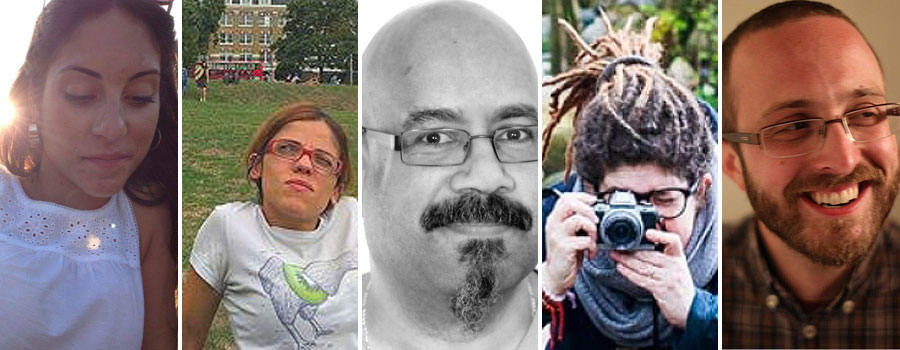
From left to right: Ana Silva, Stefania Mattana, Mike Little, Tammie Lister, Nate Wright
Halfway between London and Edinburgh in the north, lies Manchester, the industrial capital of England and home to Mike Little, co-founder of WordPress. Mike has been developing software since the mid-1980’s, and it was in January of 2003 when he and Matt Mullenweg forked Cafelog/BS which will later become WordPress. Mike now owns a company Zed1.com and concentrates on all things WordPress – consulting, development training and hosting.
In Edinburgh, Scotland, we talk with Nate Wright, one of the organizers of WordCamp Edinburgh. Nate runs a small theme and plugins shop aimed at restaurants. He says that he started coming to the WordPress meetup mostly because he thought that he had to, but then he found it was a great resource for meeting other WordPress professionals.
Mike: Our Manchester WordPress User Group is a great local community. There are more than 700 people registered on meetup.com and we regularly get 25 – 45 people attending our sessions on the third Wednesday of each month. We generally have two talks: a short user/marketing/etc focussed one, and a longer in-depth (often technical) one. We also have a popular and successful clinic session: “Bring your laptop and a WordPress problem or question and someone will help you.”
Nate: We’re a friendly mix of developers and users who meet up once a month. Sometimes we’ll have a topic and a speaker, but we’ve had a lot of fun with more informal chats that cover everything from security to themes to a frank and earnest discussion on sliders. The monthly Meetup has helped us find a lot of great talent in our community, including one of the top users on WordPress Stack Exchange, Stephen Harris, as well as what may be one of the largest WordPress multisite installations in existence Glow Connect. Last year we put together WordCamp Edinburgh 2015, and that turned out to be a great boost to our community.
Tammie: Brighton has had a WordPress community for a while, however it’s always been fairly small. The digital community here is actually very alive and thriving. We even have a digital festival every September. The WordPress community here has several core people that have stayed with it for a while, but we’re also growing with each Meetup. That’s so cool to see and be part of. It tends to be a real mixture of users, designers and developers. Brighton itself has a strong tradition of user experience, design and a really lively hacking community. This means we benefit from the variety in our WordPress community.
Brighton is home to various events important to the web industry like dConstruct, UX Brighton, and the Ampersand Conference to name just a few, and in less than two months the local community will host its first WordCamp Brighton, on July 23-24. Unlike Brighton, the London community is large and already organizes its own WordCamp, the second largest WordCamp in Europe (after WordCamp Europe, of course).
Ana: London WordPress Meetups are generally large – often between 40 – 60 people are present and the topics range wildly from advanced technical talks to informal talks for beginners. There is generally always a tech heavy talk on development, but I think people want these types of talks rather than something light and informal. I think the reasons for coming to Meetups also differ, I feel like some people come along to network and talk to the community, whereas others are not very interested in that and come to Meetups to sit, listen and take notes. I think it’s really important to maintain an educational feel and ensure people leave feeling like they learnt something new. Likewise, the sense of community has a really positive and empowering effect. I feel like WP London Meetups balance these two agendas well.
The community is large and multifaceted and often people are from London but from neighboring regions. I met many people at WCLDN 2016 who were not regulars at the WP London Meetups but had their monthly Meetup elsewhere. I think the London WordPress community benefits greatly from this.
People from the UK do travel to be volunteers at WordCamps across the UK and throughout Europe. But that’s not the only way the UK’s community is connected. The community’s Slack channel is a first step in communicating with one another and as Tammie says, “this helps bonds throughout the country.”
Stefania: Even if the UK is bigger than we may think, people are happy to travel and speak to other Meetups and WordCamps.
Mike alone has been involved with 12 or more WordCamps in the UK – as an organizer or speaker. But, there is a problem with first-time speakers and this is where mentoring comes in handy.
This has been done in the past by Manchester community as Mike recalls, “We have also encouraged and mentored some first-time speakers at both the meetup and WordCamps.”
Tammie continues: We often struggle with finding speakers, something all WordCamps do. Recently, to try something different there was a workshop on learning to speak. I think based on that success, we probably will try more different formats in the future. We also had a group discussion a few Meetups ago that worked really well. It seems for our attendees that workshops and group discussions really work well.
While you build your community it doesn’t always go smooth.
Mike: In the early days, attendance was poor. The lowest point was just three people. But once we had a regular night every month and a fixed venue (the very wonderful MadLab) the group rapidly grew.
There is a whole different situation in Brighton, where it’s own creative culture and openness to various communities has its drawbacks.
Tammie: Brighton has a lot of Meetups, so this means we’re in competition for busy people’s time. Growing any Meetup is hard, we’ve certainly found that. We knew when we did create a WordCamp, that it had to be small enough because of the community, but big enough to encourage it also. A hard balancing act, one we hope to have achieved by having a smaller WordCamp. We hope the WordCamp is a stimulus to our community.
Small attendance numbers are not the only challenge the community could be facing. People visiting a Meetup and then never returning back is another one. When you have technical Meetup aimed at advanced users, new or inexperienced users won’t return next time. But there is a solution.
Mike: We helped solve that by splitting our meeting into two halves. The first half concentrated on new users, and non-technical talks. The second half (after a 30 minute networking break) would then be more technical. Anyone was welcome to turn up for the first half and leave after that part. Similarly some people turned up for the second half only.
The Edinburgh community had the similar problem but approached it from another direction.
Nate: We struggled to find topics and speakers that were suitable for the broad range of skills and interests that our members hold. In the end, we decided it was a futile effort that was just degrading the quality of our meetings. Now we don’t mind if a talk is too technical or too user-oriented. We focus on the chat before and after the talk because that’s where we can really connect with our members.
Building a community is not an easy task. Jenny Wong of WordCamp London knows that and she did an amazing job this year, building up a team that worked together for the first time. Stefania and Ana recall that challenge.
Stefania: WordCamp London 2016 is a quite successful story. The lead organiser Jenny Wong has called around her people who had never organised a WordCamp. We all ended up facing new challenges and the event turned up amazingly. This is a story that proves how anyone can start from scratch within the WordPress community and deliver an awesome job, with the cooperation of the experienced buddies shadowing.
Ana: Personally, one of the challenges I felt I had to overcome was the general lack of understanding of the core WordPress community and the semi-loose rules and regulations surrounding the organisation of WordCamps. Having someone on the team who is well-versed in these rules was invaluable and to be honest, I would think that without that knowledge and expertise we would’ve made many more mistakes!
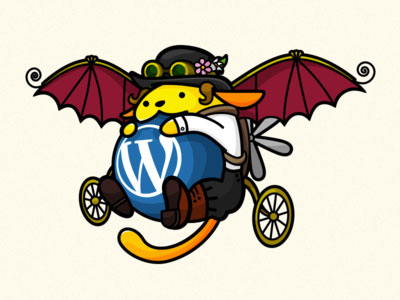
Steampunk Wapuu – WordCamp London Mascot
With active communities more and more people volunteer, organize and talk. This can only be done when people are open to the very foundation of WordPress and what it stands for. And the good thing is that not only individuals are open to WordPress’s core mission, but agencies too.
Tammie: We are lucky enough to have a lot of strong agencies in Brighton. There is a real sense that the freelancers and agencies help each other out. Pragmatic Web has a lot of people involved in the community and several of them are part of the organisers for WordCamp Brighton. Founder David Lockie, along with Paul Bunkham and Dasha Luna (who works at Human Made), has been with this community from the early days. It’s great when agencies that have grown in a city, give back to that place. We have a lot of people who’ve grown in this community to do amazing things. We also have a lot of people giving a lot of time to the community and making Brighton a better place to be. Alice Still for example, who has created our voice for the WordCamp and does all our writing, she is a founder of Brighton Digital Women. Brighton has a wealth of talent and we’re lucky to be growing a small but strong community in WordPress here. I look forward to hearing a lot more success stories during WordCamp Brighton and beyond.
In Brighton, we see what can happen when individuals stand together to make a better place to live. This can also be seen in London, Manchester and any other local community in the UK. Sharing knowledge and helping each other is the very essence of both open source and WordPress and this can easily be achieved with volunteering at various events, as Ana Silva discovered.
Ana: I volunteered at my first WordCamp about 10 months ago and several months later (after a few more volunteering stints!) I found myself organising WordCamp London. I have to say that my previous experience as a volunteer and exposure to the various different local communities was an invaluable experience for me and showed me how different and varied WordCamps can be. I think having this freedom ensures that organisers are able to learn what works and what attendees need – I had several conversations with organisers at WCLDN who told me they would be making use of many of the additional accessibility features we had added to the event. It’s things like this that make WordCamps extraordinarily unique conferences.
At the end of our talk with active UK’s community, Nate sums the importance of visiting Meetups in one sentence.
Nate: I think the fact that I can meet, in one Meetup, people who are great coders, designers, project managers and content authors is kind of the “secret sauce” behind WordPress’ success.
Get in touch with the WordPress community in the United Kingdom
- Fellow organizers: (London) Jenny Wong, Stefania Mattana, Ana Silva; (Brighton) Tammie Lister, Dasha Luna, David Lockie, Paul Bunkham, Elliot Taylor; (Manchester) Mike Little, Saz Bailey, Tom Nowell; (Edinburgh) Iain Taylor, Lloyd Roger Spencer, Marcus Wilson, Nate Wright; (Leeds) Tim Nash, Samantha Miller, Steph Walker, Dave Pullig, Matthew Haines-Young
- WordPress UK
- WordCamps in the UK: London, Brighton, Manchester, Edinburgh
- Official UK Slack channel
- WordPress Meetup London + Community website
- Twitter (@wpldn)
- WordPress Meetup Brighton
- WordPress Meetup Manchester
- WordPress Meetup Edinburgh
- Twitter (@wcedin)
- WordPress Leeds
- Twitter (@wpleeds)
Netherlands – tulips, windmills, channels and ever growing WordPress community
Separated from the United Kingdom by the North Sea lies the Netherlands. Historically, both of these nations competed for control of global sea commerce and who would prevail as the world’s superpower. Years before the Internet and e-commerce, the Netherlands grew up as a nation of traders and explorers. The Dutch were the first to discover Australia and New Zealand, and New York started as a Dutch colony called New Amsterdam. With two capitals–Amsterdam and Hague–the Netherlands is known for its tulip industry, channels, and windmills. It’s the country whose inventions such as the microscope and the telescope shaped the industrial world; like the video tape or the compact disk (which was invented by the Dutch company Philips) shaped the modern world as we know it.
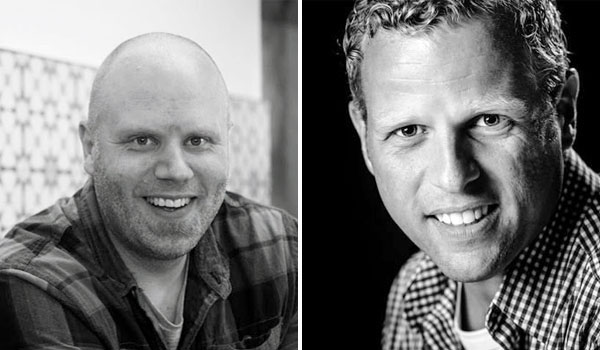
Remkus de Vries and Marcel Bootsman
In the Netherlands, we talk with Remkus de Vries and Marcel Bootsman. Remkus is well known to WordPress enthusiasts throughout Europe as co-founder of WordCamp Europe. He’s also CEO of the Dutch WordPress agency Forsite Media, and the admin for the Dutch WordPress site. Marcel is an experienced self-employed WordPress specialist at Nostromo.nl. He likes giving back to the WordPress community by creating plugins and helping with translations. He’s the current organizer of WordCamp Netherlands and WordCamp Europe. We ask them to tell us more about the Dutch community.
Remkus: We have a very vibrant community in the Netherlands that really started to pick up two years ago with multiple WP Meetups. There’s an overview of WP Meetups on our Rosetta site that is ever expanding, but what’s most significant is its openness and willingness to share knowledge.
Marcel: The Dutch WordPress Community is a warm, open and friendly community. With a yearly country-wide WordCamp since 2009 and 10+ WP Meetups, we can say we have a very active community. Currently we are preparing WordCamp Netherlands 2016, in a new, larger venue, so we can share all the best of our national and international WordPress specialists to an even larger public.
Like any community, the Dutch community had its ups and downs. Back in 2008, not a lot was happening with the Dutch WordPress site as well as the Dutch translations and the overall releases. There were months of waiting between the official and Dutch release of WordPress. Back then, Remkus took the helm, which resulted in community growth and the first ever WordCamp Netherlands.
Remkus: I started taking matters into my own hands and a year later I was granted access to the Dutch Rosetta site and the forums and start getting in the groove of improving all the Dutch WordPress things with the help of a translation team and moderators for the forums. Having a proper translated version of WordPress helped grow our community tremendously and make using WordPress in the Netherlands so much more of a logic choice. This also made the Dutch community be more aware of themselves and led to organizing the first WordCamp Netherlands back in 2009.
From 2009, WordCamp Netherlands has been organized in the city of Utrecht which is a logical choice thanks to its favorable central position in the Netherlands. And thanks to all that, as Marcel said, today the Dutch community is more open and friendly than ever.
Marcel: Everybody shares, everybody is open to questions, everybody is willing to help others. In other words, I do not see any problems with the community right now, and in the near future.
Having all that in mind it’s no wonder that Dutch community grows every year.
Remkus: From the very first WordCamp Netherlands ’til last year’s we’ve seen the community grow and become more mature, but it wasn’t until 2013 when the first edition of WordCamp Europe took place, before it really started taking off for the larger community. That’s the year people started organizing more local Meetups and haven’t stopped organizing more ever since!
Stronger community impacts the position of WordPress too, as a solution for building larger and more business-oriented websites.
Marcel: We see a growth in corporate usage of WordPress and a fast growth of professional WordPress hosting companies in the Netherlands. This strengthens the market and eliminates the judgement of some that WordPress is not a solid product to build corporate or large custom solutions.
Get in touch with the WordPress community in Netherlands
- Fellow organizers: Remkus de Vries, Marcel Bootsman, Barry Kooij, Bas van der Lans, Taco Verdonschot, Luc Princen, Wendy Weel
- WordPress Netherlands
- Twitter (@WordPress_NL)
- WordCamp Netherlands
- Twitter (@WordCampNL)
- Official WordPress Nederland Slack channel
- List of Meetups in Netherlands
Belgium – WordPress as sweet as chocolate
Bordering Netherlands is Belgium, famous for its chocolate industry and beers. Having more than 800 kinds of beer and producing more than 220,000 tons of chocolate each year, Belgium is a country you could live in. Its capital, Brussels, is the home of the Brussels sprout and the European Union, hosting many of its institutions within the European Quarter. The Belgian WordPress community is organizing their first WordCamp in the city of Antwerp, scheduled for next week, June 4-5.
We’re talking with Kristof Bernaert, organizer of the Brussels Meetup, and Dave Loodts and Veerle Verbert, organizers of the Antwerp Meetup and WordCamp Antwerp. Kristof is a full-stack web developer focused on WordPress, UX, open data and typography. Dave owns a one-man web design firm and has worked with WordPress for the past 6 years. Veerle has been working with WordPress for around 10 years. She thanks the community for the openness that helped her evolve from being a noob to respectfully building websites and web apps with WordPress.
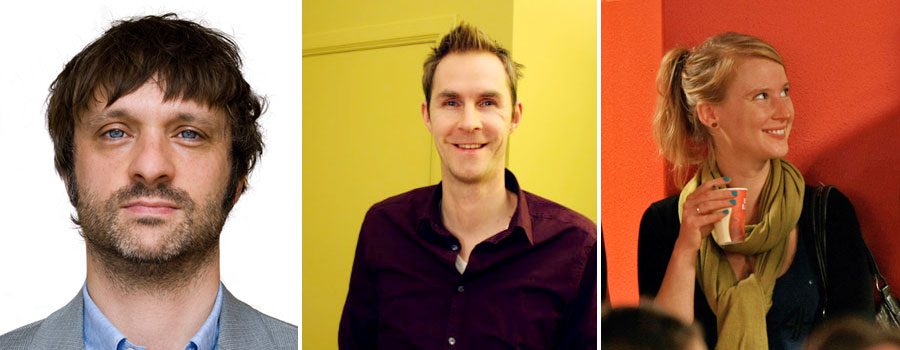
From left to right: Kristof Bernaert, Dave Loodts, Veerle Verbert
Serving as a lead organizer of WordCamp Antwerp, Dave never dreamt of that just 4 years ago when he attended the first WordCamp Europe. Over the course of those two days, he recalls, he had met only one person from Belgium. But everything changed, literally, in the last 10 minutes.
Dave: A group of around 10 Belgian WordPressers quite closed the venue let’s say. It was a nice moment for me to finally meet local WordPress people, including Veerle Verbert to startup Meetup Antwerp some 6 months later.
What was once a meetup is now a WordCamp happening in little more than a week.Veerle: Though being young, we always have a steady interest in each and every Meetup we’ve organized so far. So that’s really great. And we’re getting great feedback on the WordCamp Antwerp: lots of speaker applications, a bunch of volunteers who stepped up, a fine ticket sale so far: it’s quite exciting.
Belgium is not such a large country. You could drive through it in less than 3 hours. Currently, there are Meetups being organized in Brussels, Antwerp, Ghent and Luik. The Brussels Meetup officially started in January of 2013.
Kristof: By average we have 10 visitors per Meetup. The Meetups are monthly, but on low season periods we skip it (like December or summer months). There are in total 500 Meetup members but with a large variety of origin. As Brussels is an international hub a lot of members join when they are for a while in Brussels.
Nowadays, the Belgian community is active on their Slack. In a year, around 200 people opened accounts on it. The Slack team serves as a single most important point of communication between community members. There, they discuss Meetups and WordCamp Antwerp too.
Dave: One of the goals of the first WordCamp is trying to bring more people together to start new Meetup groups. The following Belgian cities have registered to be a Meetup place, but need a helping hand: Ghent, Mons, the Belgian Coast, Liege and Hasselt. So if Belgian people want to help with starting up the Meetup, give us a shout.
Organizing Meetups can be challenging, especially when people don’t show up. Luckily, Antwerp didn’t have this problem.
Veerle: While still in doubt whether it was a good plan to go ahead with that Meetup and being nervous that the speakers’ preparations would be in vain, 40 people showed up. This was a really nice start.
The problem of more than 50% of no-shows was a serious one for organizers of the Brussels Meetup, so they came up with an interesting solution.
Kristof: We started to charge with a small fee from 5 to 7 euros. This helps to avoid full booked events where +50% do not show up. In return we do offer food and booze for free. This helps a lot to help people come over and have an evening dinner at the meetup.
The WordPress community in Belgium is no different than those in other countries. They try to volunteer or speak at Meetups and WordCamps in the region, especially WordCamp Netherlands, which is really close. Meetups are mostly visited by developers, designers, bloggers, but also by people who are in search for a career change.
Kristof: Since our local meetup in Brussels we see on regular base people starting a new business (mostly as single person) with the use of WordPress. Most of them want to know WordPress better as a communication platform. A few are really starting a web studio offering WordPress related services like design, front-end development.
The biggest challenge in years to come is building a stronger base of all people working with, or on top of WordPress.
Dave: Another ‘problem’ is the difficulty to reach out and connect with the basic WordPress users. All the Belgian Meetup leads and speakers often are developers/designers with more than 5 years of WordPress experience. Very dedicated and love to talk about the latest code, plugins, and so on. And their network of people reaches to other designers/developers – that’s normal. But the challenge is to reach those basic users in order to grow the Belgian community in its width. For me, that would the challenge of 2016-2017.
Veerle: Trying to break out, I know there are a lot of people working a lot with WordPress in Belgium, but I think they don’t see themselves as WordPressers. No problem of course, but to get the widest view, it just would be great if they would get in touch as well.
From the first WordCamp Europe to the first WordCamp Antwerp there is only a 3-year span. While we will be in Vienna to meet new people from all over Europe and the world, it’s important to remember that it all starts with local efforts.
Dave: Setting up the first Belgian WordCamp can hopefully be called a success story but it seems it’s going very well. A lot of people signed up to attend, we had to disappoint a bunch of potential speakers because we had so many talk submissions and there are still people applying to volunteer.
In the end, you can be only as good as your teammates are.
Veerle: I wanted to do something for a long time, but didn’t dare to take all the decisions and workload/engagement myself. When Dave was willing to join in on organizing the Antwerp meetups, it just took off. Working with Dave really feels natural.
Get in touch with the WordPress community in Belgium
- Fellow organizers: (Brussels) Kristof Bernaert; (Antwerp) Dave Loodts, Veerle Verbert (WordCamp Antwerp co-organizers) Tom Hermans, Shaun Janssens, Brecht Ryckaert, Csaba Varszegi
- WordPress Belgium (Dutch, French)
- Twitter (@wpmeetupbe)
- Official Belgium Slack channel
- WordCamp Antwerp
- WordPress Meetup Brussels + Community website
- WordPress Meetup Antwerp
- Twitter (@wpantwerp)
- WordPress Meetup Liege
- Twitter (@wpliege)
- WordPress Meetup Mons
- Twitter (@wpmons)
- WordPress Metup Ghent
France – a community in love with WordPress
What comes first to mind when you think of France? Maybe the purple lavender fields of Provence or the beauty of castles like Versailles. There is a lot of history too. The Louvre is probably the most famous museum in the world, holding not only French history but a grasp of world history as well. And one of the most famous landmarks of the world—the Eiffel tower—is a must to visit when you’re in Paris. You also have the high-speed TGV trains that will take you almost anywhere in France within a couple of hours. And I could go on if this article was only about the French WordPress community…
Mathieu Viet is a BuddyPress core developers and WordPress / BuddyPress / bbPress plugin author living in Paris. He is one of the founding members of WP Paris association, a nonprofit that connects WordPress enthusiasts living in and around Paris, and co-organizer of WordCamp Paris. Together with Mathieu is Jenny Beaumont, who many of you know as this year’s lead organizer of WordCamp Paris and a WordCamp Europe co-organizer.
Aurélien Denis is the recently elected president of WordPress Francophone, the long-standing organization that links people that love WordPress across France, and co-organizer of WPMX Day 2015 in Biarritz. Jean-Baptiste Marchand-Arvier, living in Lyon, is a co-founder of WP Media, the company behind well-known plugins WP Rocket and Imagify, and co-organizer of WordCamp Lyon. In Nantes, we talk with Daniel Roch, a WordPresser since 2006 as an SEO and WordPress consultant, and co-organizer of WP Tech, an independent development-oriented conference.
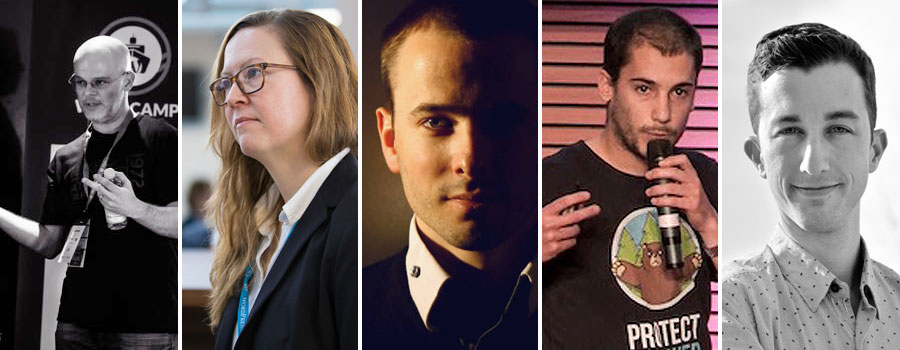
From left to right: Mathieu Viet, Jenny Beaumont, Daniel Roch, Jean-Baptiste Marchand-Arvier, Aurélien Denis
We ask them to tell us a bit about their local communities.
Mathieu: The Paris community goes back as far as 2006, started by Xavier Borderie, Amaury Balmer, Mathieu Bellon and others. There have Paris WordCamps consistently since 2008, but the local Meetup group had died off in recent years. A bit after the first WordCamp Europe in Leiden, Thierry Pigot took the lead of this Meetup Group and invited me and Gregoire Noyelle to join as organizers. Since then we are trying to organize a Meetup at each end of the month to discuss about WordPress. 15 to 30 people are regularly coming to these Meetups to share their love, experience and ask questions about WordPress, themes, plugins, freelancing etc. Meetups are usually scheduled around 18 PM and last ’til 20 to 21 PM. Once the Meetup is finished we love to have dinner at a Pizza restaurant together (well the people who could stay till this late ;)).
Jenny: I got involved with the WordPress community in 2013, after I had already left Paris for Normandy. At the time, it was the only active community in France putting on major events. But that’s quickly changed. This year WordCamp Paris grew to 500 participants. Lyon will be putting on its second WordCamp later this year, and Nantes and Biarritz continue to put on their indie events, which draw people from all over the country.
Aurélien: We are providing recurring conferences on monthly base on different topics like e-commerce, development, SEO, etc. with different local speakers. Our main objective is to gather the local WordPress fans and organize a national event. These objectives have been accomplished and we have started organizing local meetups in other regions of France.
The Lyon community started in 2014. Jean-Baptiste says, “We wanted to organize a WordCamp in our city, but first things first! So we started to organize local Meetups and one year after our first WordCamp!” On these Meetups, they talk about various topics like Advanced Custom Fields, actions, and filters, OPP and security.
The community in Nantes got organized in 2012, starting with local Meetups (1 hour with a WordPress experts). It then grew to include WP Tech, which started in 2014.
We ask them how is the French community connected and we get an almost unanimous answer that, “it is like a family”. A lot of meetups are happening across France. There are WordPress meetups in Rennes, Nice, Grenoble and Toulouse, Le Mans, Lille, Strasbourg; a BuddyPress Meetup in Bordeaux and the cities of Marseille and Bordeaux are looking to put on their first WordCamps in the near future.
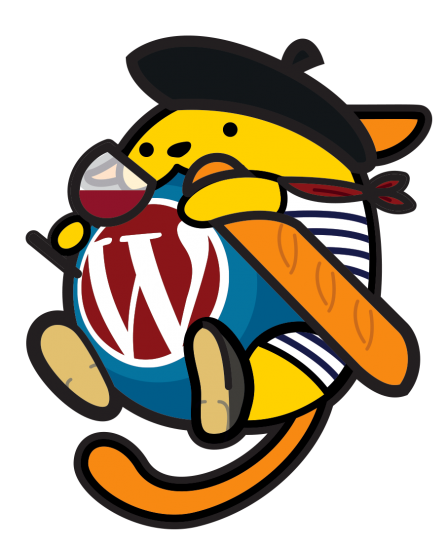
Marcel, the French Wapuu
Members do vary based on the city size and location and this also impacts people that form the local communities. There are freelancers (developers and designers), small web agencies, journalists, SEO experts, marketers, business owners, bloggers…
With these connections, community members don’t mind traveling between Meetups, WordCamps, and other WordPress-based events. Some of them are also travelling to WordPress events across Europe (mostly WordCamps like WordCamp London or WordCamp Europe). And all of this sounds almost perfect, but were there any problems or better yet—challenges—that the community faced?
Mathieu: Our main issue is to find a place to meet! So far we are meeting at Quigley’s Point, which is a pub. So with Thierry Pigot and Grégoire Noyelle we’ve created the WP Paris association so that we can try to rent/find a better place. And why not organize other type of events. The association is giving us an identity so that we can take insurance in case of trouble.
Jean-Baptiste: It’s quite a challenge to have people in Meetups both as participants and speakers. Lots of people say “yes” at the event, but the end don’t come. We found that bringing appetizers, helps a lot to bring more people.
Daniel: With WordCamp resources, it was quite easy to set up our Meetups and then WP TECH. The only main issue was to be able to gather people in the organization team.
Jenny: The strength of the French community is that we are both local and national. There is a lot of mutual support. There are challenges of course, but in the short time I have been contributing as an event organizer, I’ve had the pleasure of witnessing such incredible community growth – an enormous will to overcome obstacles, to share, to learn and to build incredible things…together
Having communities that are well linked together helps people travel and talk on friendly events. Because of that, it’s not unusual that people from local communities have talked at WordCamp Paris, WordCamp Lyon or at other tech events, which is an amazing achievement.
Get in touch with the WordPress community in France
- Fellow organizers: (Paris) Jenny Beaumont, Mathieu Viet, Thierry Pigot, Grégoire Noyelle, (Nantes) Daniel Roch, Willy Bahuaud, Simon Janin, Stéphanie Vachon; (Lyon) Jean-Baptiste Marchand-Arvier, Benoit Mercusot, Jonathan Buttigieg; (Grenoble) Maxime Bernard Jacquet; (Toulouse) Nicolas Richer; (Morcenx) Aurélien Denis, Mickaël Gris, Noëlle Béronie
- WordPress France
- WordCamp Paris
- WordCamp Lyon
- Twitter (@wplyon)
- WordPress Meetup Paris + Community website
- Twitter (@wpparis)
- WordPress community Nantes
- WordPress Meetup Lyon
- WordPress community Morcenx
Take part in European communities article series
While we started to work on the article series about European WordPress communities, we sent emails to all the organizers from various countries and cities. If you still haven’t answered please answer to the survey. If you didn’t receive an email from us but would like to be part of this article series – get in touch with us from our contact page.


































